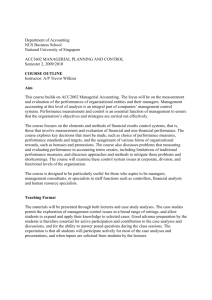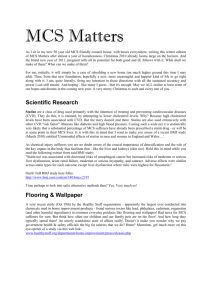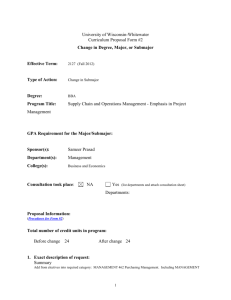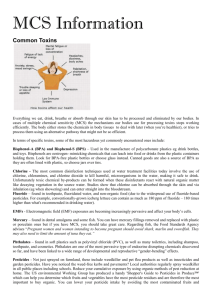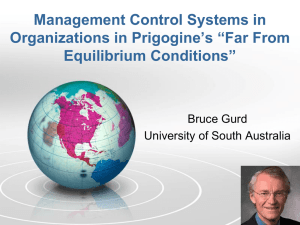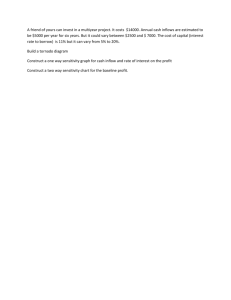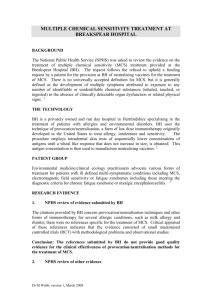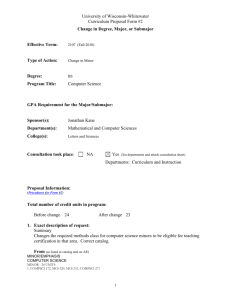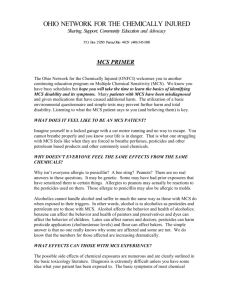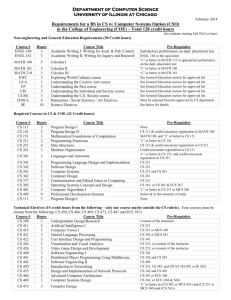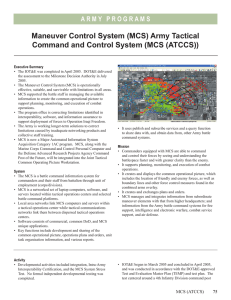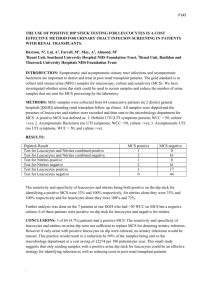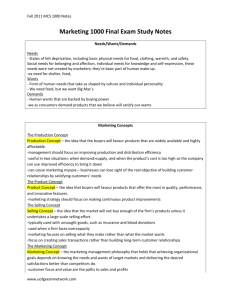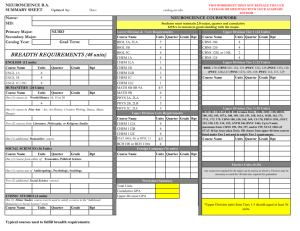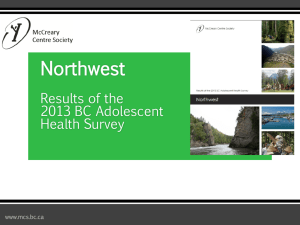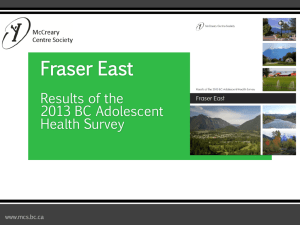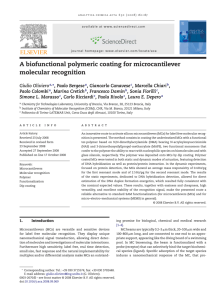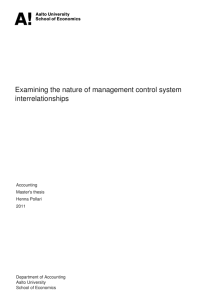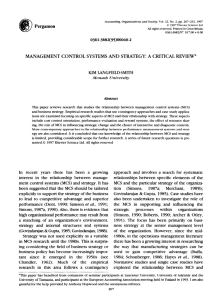Response to Working Draft Report
advertisement
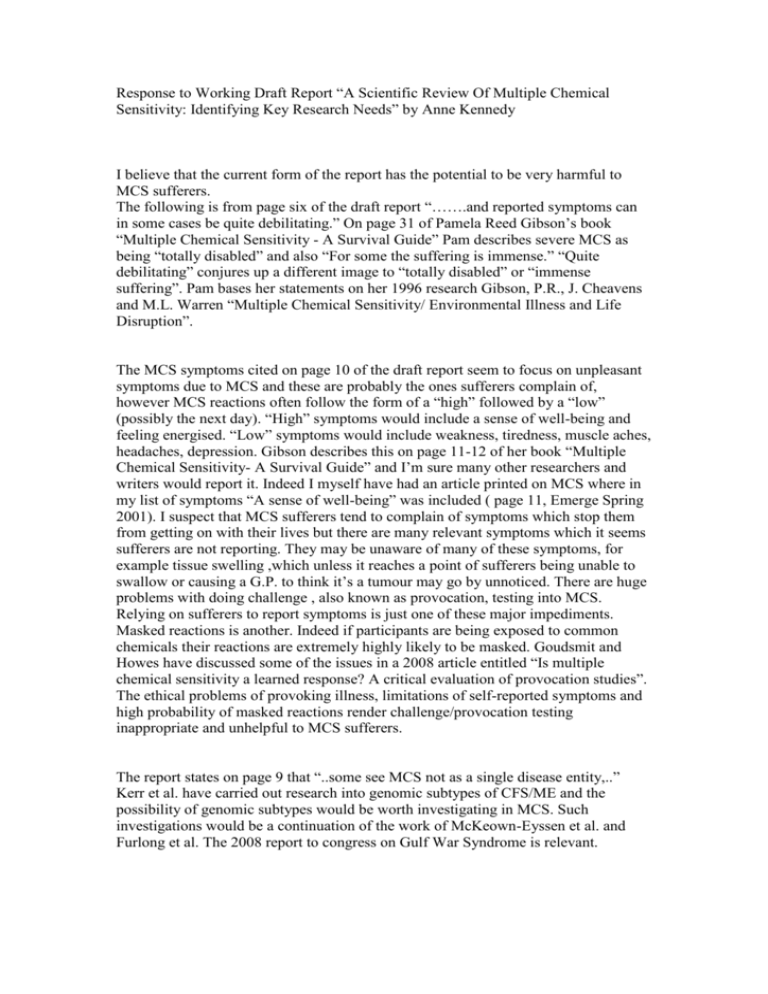
Response to Working Draft Report “A Scientific Review Of Multiple Chemical Sensitivity: Identifying Key Research Needs” by Anne Kennedy I believe that the current form of the report has the potential to be very harmful to MCS sufferers. The following is from page six of the draft report “…….and reported symptoms can in some cases be quite debilitating.” On page 31 of Pamela Reed Gibson’s book “Multiple Chemical Sensitivity - A Survival Guide” Pam describes severe MCS as being “totally disabled” and also “For some the suffering is immense.” “Quite debilitating” conjures up a different image to “totally disabled” or “immense suffering”. Pam bases her statements on her 1996 research Gibson, P.R., J. Cheavens and M.L. Warren “Multiple Chemical Sensitivity/ Environmental Illness and Life Disruption”. The MCS symptoms cited on page 10 of the draft report seem to focus on unpleasant symptoms due to MCS and these are probably the ones sufferers complain of, however MCS reactions often follow the form of a “high” followed by a “low” (possibly the next day). “High” symptoms would include a sense of well-being and feeling energised. “Low” symptoms would include weakness, tiredness, muscle aches, headaches, depression. Gibson describes this on page 11-12 of her book “Multiple Chemical Sensitivity- A Survival Guide” and I’m sure many other researchers and writers would report it. Indeed I myself have had an article printed on MCS where in my list of symptoms “A sense of well-being” was included ( page 11, Emerge Spring 2001). I suspect that MCS sufferers tend to complain of symptoms which stop them from getting on with their lives but there are many relevant symptoms which it seems sufferers are not reporting. They may be unaware of many of these symptoms, for example tissue swelling ,which unless it reaches a point of sufferers being unable to swallow or causing a G.P. to think it’s a tumour may go by unnoticed. There are huge problems with doing challenge , also known as provocation, testing into MCS. Relying on sufferers to report symptoms is just one of these major impediments. Masked reactions is another. Indeed if participants are being exposed to common chemicals their reactions are extremely highly likely to be masked. Goudsmit and Howes have discussed some of the issues in a 2008 article entitled “Is multiple chemical sensitivity a learned response? A critical evaluation of provocation studies”. The ethical problems of provoking illness, limitations of self-reported symptoms and high probability of masked reactions render challenge/provocation testing inappropriate and unhelpful to MCS sufferers. The report states on page 9 that “..some see MCS not as a single disease entity,..” Kerr et al. have carried out research into genomic subtypes of CFS/ME and the possibility of genomic subtypes would be worth investigating in MCS. Such investigations would be a continuation of the work of McKeown-Eyssen et al. and Furlong et al. The 2008 report to congress on Gulf War Syndrome is relevant. Additional References Furlong et al. “Role of Paraoxonase Enzyme Level and Polymorphisms in Pesticide Sensitivity” National Institute of Environmental Health Sciences (NIEHS), 2005 Furlong “Genetic variability in the cytochrome P450-paraoxonase 1 (PON 1) pathway for detoxication of organophophorous compounds” J. Biochem. Mol. Toxicol., 2007 Gibson, P.R.,J. Cheavens and M.L. Warren “Multiple Chemical Sensitivity/Environmental Illness and Life Disruption” Women and Therapy 19:63-79 Gibson,P.R. “Multiple Chemical Sensitivity-A Survival Guide” pub:New Harbinger Publications, 2000 Goudsmit and Howes “Is multiple chemical sensitivity a learned response? A critical evaluation of provocation studies” J. Nutritrit. And Environmental Medicine, 2008 Kennedy,A. “Multiple Chemical Sensitivity” Emerge, J. of ME/CFS Society of Victoria, Spring ,2001 Kerr et al. “Seven genomic subtypes of Chronic Fatigue Syndrome/Myalgic Encephalomyelitis (CFS/ME):a detailed analysis of gene networks and clinical phenotypes” Journal of Clinical Pathology, 2007 Little,Dr C.H. “A Guide to Allergy and Related Disorders” pub:Vaba Publishing,1989 Maugh and Engel “Report to Congress:Gulf War syndrome is real” Los Angeles Times, Nov. 18, 2008

